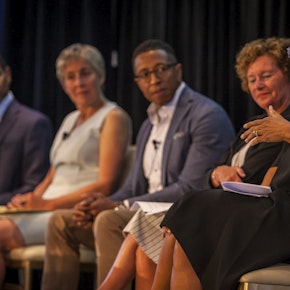Explore
Search results

Do American universities have an obligation to educate their students to be the next generation of citizens and civic leaders? What does it mean for a university “to offer students an education that will promote their flourishing as human beings, their judgment as moral agents, and their participation in society as democratic citizens”? Join a workshop with leaders from th...

Since the end of World War II, the United States has dramatically expanded access to a college education so that, today, approximately two out of every three Americans pursues a higher education. Still, many groups remain largely excluded, and even among those who do go, where a student starts college has become increasingly tied to their wealth and that of their families....

In this new Aspen Ideas format, all attendees gather each morning to kick off the day by exploring a current issue of deep complexity. Debates over the content of our historical narrative and cultural values have Americans of differing ideologies engaged in heated battle, with educators and students caught in between. Meanwhile, have we failed to meaningfully educate o...

What should every American know? This question has long been debated, discussed, and deliberated. Amidst giant demographic and social shifts, it is more important than ever to define some common knowledge — cultural, pop cultural, historical, civic facts, memes, and references that every American should know. Answers need to come from all of us, not just a powerful few. Th...

Is America turning its back on the humanities? The evidence seems real when we see declining enrollments in the studies of arts, history, literature, language, and philosophy at colleges and universities across the country. Declining enrollments preface limited budgets for broad areas of inquiry as the promise of STEM curricula woos students to jobs and career paths. I...

